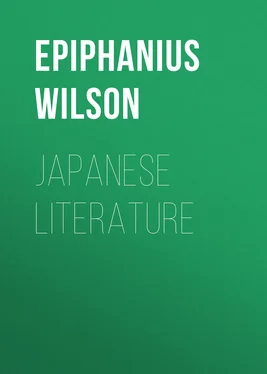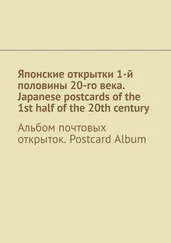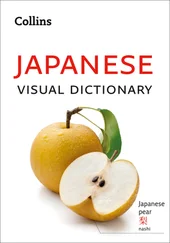Epiphanius Wilson - Japanese Literature
Здесь есть возможность читать онлайн «Epiphanius Wilson - Japanese Literature» — ознакомительный отрывок электронной книги совершенно бесплатно, а после прочтения отрывка купить полную версию. В некоторых случаях можно слушать аудио, скачать через торрент в формате fb2 и присутствует краткое содержание. Жанр: foreign_prose, Языкознание, foreign_antique, на английском языке. Описание произведения, (предисловие) а так же отзывы посетителей доступны на портале библиотеки ЛибКат.
- Название:Japanese Literature
- Автор:
- Жанр:
- Год:неизвестен
- ISBN:нет данных
- Рейтинг книги:3 / 5. Голосов: 1
-
Избранное:Добавить в избранное
- Отзывы:
-
Ваша оценка:
- 60
- 1
- 2
- 3
- 4
- 5
Japanese Literature: краткое содержание, описание и аннотация
Предлагаем к чтению аннотацию, описание, краткое содержание или предисловие (зависит от того, что написал сам автор книги «Japanese Literature»). Если вы не нашли необходимую информацию о книге — напишите в комментариях, мы постараемся отыскать её.
Japanese Literature — читать онлайн ознакомительный отрывок
Ниже представлен текст книги, разбитый по страницам. Система сохранения места последней прочитанной страницы, позволяет с удобством читать онлайн бесплатно книгу «Japanese Literature», без необходимости каждый раз заново искать на чём Вы остановились. Поставьте закладку, и сможете в любой момент перейти на страницу, на которой закончили чтение.
Интервал:
Закладка:
The period to which her story relates is supposed to be the earlier part of the tenth century after Christ, a time contemporary with her own life. For some centuries before this period, our country had made a signal progress in civilization by its own internal development, and by the external influence of the enlightenment of China, with whom we had had for some time considerable intercourse. No country could have been happier than was ours at this epoch. It enjoyed perfect tranquillity, being alike free from all fears of foreign invasion and domestic commotions. Such a state of things, however, could not continue long without producing some evils; and we can hardly be surprised to find that the Imperial capital became a sort of centre of comparative luxury and idleness. Society lost sight, to a great extent, of true morality, and the effeminacy of the people constituted the chief feature of the age. Men were ever ready to carry on sentimental adventures whenever they found opportunities, and the ladies of the time were not disposed to disencourage them altogether. The Court was the focus of society, and the utmost ambition of ladies of some birth was to be introduced there. As to the state of politics, the Emperor, it is true, reigned; but all the real power was monopolized by members of the Fujiwara families. These, again, vied among themselves for the possession of this power, and their daughters were generally used as political instruments, since almost all the Royal consorts were taken from some of these families. The abdication of an emperor was a common event, and arose chiefly from the intrigues of these same families, although partly from the prevailing influence of Buddhism over the public mind.
Such, then, was the condition of society at the time when the authoress, Murasaki Shikib, lived; and such was the sphere of her labors, a description of which she was destined to hand down to posterity by her writings. In fact, there is no better history than her story, which so vividly illustrates the society of her time. True it is that she openly declares in one passage of her story that politics are not matters which women are supposed to understand; yet, when we carefully study her writings, we can scarcely fail to recognize her work as a partly political one. This fact becomes more vividly interesting when we consider that the unsatisfactory conditions of both the state and society soon brought about a grievous weakening of the Imperial authority, and opened wide the gate for the ascendency of the military class. This was followed by the systematic formation of feudalism, which, for some seven centuries, totally changed the face of Japan. For from the first ascendency of this military system down to our own days everything in society—ambitions, honors, the very temperament and daily pursuits of men, and political institutes themselves—became thoroughly unlike those of which our authoress was an eye-witness. I may almost say that for several centuries Japan never recovered the ancient civilization which she had once attained and lost.
Another merit of the work consists in its having been written in pure classical Japanese; and here it may be mentioned that we had once made a remarkable progress in our own language quite independently of any foreign influence, and that when the native literature was at first founded, its language was identical with that spoken. Though the predominance of Chinese studies had arrested the progress of the native literature, it was still extant at the time, and even for some time after the date of our authoress. But with the ascendency of the military class, the neglect of all literature became for centuries universal. The little that has been preserved is an almost unreadable chaos of mixed Chinese and Japanese. Thus a gulf gradually opened between the spoken and the written language. It has been only during the last two hundred and fifty years that our country has once more enjoyed a long continuance of peace, and has once more renewed its interest in literature. Still Chinese has occupied the front rank, and almost monopolized attention. It is true that within the last sixty or seventy years numerous works of fiction of different schools have been produced, mostly in the native language, and that these, when judged as stories, generally excel in their plots those of the classical period. The status, however, of these writers has never been recognized by the public, nor have they enjoyed the same degree of honor as scholars of a different description. Their style of composition, moreover, has never reached the same degree of refinement which distinguished the ancient works. This last is a strong reason for our appreciation of true classical works such as that of our authoress.
Again, the concise description of scenery, the elegance of which it is almost impossible to render with due force in another language, and the true and delicate touches of human nature which everywhere abound in the work, especially in the long dialogue in Chapter II, are almost marvellous when we consider the sex of the writer, and the early period when she wrote.
Yet this work affords fair ground for criticism. The thread of her story is often diffuse and somewhat disjointed, a fault probably due to the fact that she had more flights of imagination than power of equal and systematic condensation: she having been often carried away by that imagination from points where she ought to have rested. But, on the other hand, in most parts the dialogue is scanty, which might have been prolonged to considerable advantage, if it had been framed on models of modern composition. The work, also, is too voluminous.
In translating I have cut out several passages which appeared superfluous, though nothing has been added to the original.
The authoress has been by no means exact in following the order of dates, though this appears to have proceeded from her endeavor to complete each distinctive group of ideas in each particular chapter. In fact she had even left the chapters unnumbered, simply contenting herself with a brief heading, after which each is now called, such as "Chapter Kiri-Tsubo," etc., so that the numbering has been undertaken by the translator for the convenience of the reader. It has no extraordinarily intricate plot like those which excite the readers of the sensational romances of the modern western style. It has many heroines, but only one hero, and this comes no doubt from the peculiar purpose of the writer to portray different varieties and shades of female characters at once, as is shadowed in Chapter II, and also to display the intense fickleness and selfishness of man.
I notice these points beforehand in order to prepare the reader for the more salient faults of the work. On the whole my principal object is not so much to amuse my readers as to present them with a study of human nature, and to give them information on the history of the social and political condition of my native country nearly a thousand years ago. They will be able to compare it with the condition of mediæval and modern Europe.
Another peculiarity of the work to which I would draw attention is that, with few exceptions, it does not give proper names to the personages introduced; for the male characters official titles are generally employed, and to the principal female ones some appellation taken from an incident belonging to the history of each; for instance, a girl is named Violet because the hero once compared her to that flower, while another is called Yûgao because she was found in a humble dwelling where the flowers of the Yûgao covered the hedges with a mantle of blossom.
I have now only to add that the translation is, perhaps, not always idiomatic, though in this matter I have availed myself of some valuable assistance, for which I feel most thankful.
Suyematz Kenchio.Tokyo, Japan.
Читать дальшеИнтервал:
Закладка:
Похожие книги на «Japanese Literature»
Представляем Вашему вниманию похожие книги на «Japanese Literature» списком для выбора. Мы отобрали схожую по названию и смыслу литературу в надежде предоставить читателям больше вариантов отыскать новые, интересные, ещё непрочитанные произведения.
Обсуждение, отзывы о книге «Japanese Literature» и просто собственные мнения читателей. Оставьте ваши комментарии, напишите, что Вы думаете о произведении, его смысле или главных героях. Укажите что конкретно понравилось, а что нет, и почему Вы так считаете.












